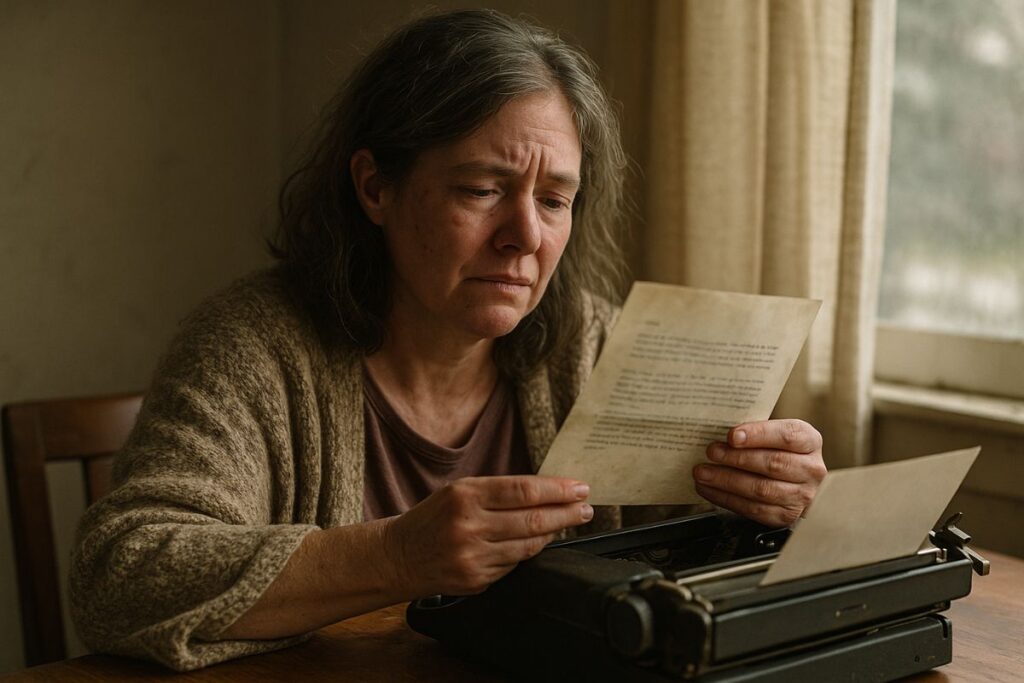🟫 Part 5 – The One Who Stayed Behind
The cassette player sat quietly beside Elena on the couch.
Its buttons now stuck with dust, its tape rolled back to silence.
But the voice still echoed in her chest.
Her father’s words hadn’t been perfect.
They had trembled. Paused. Cracked once, when he said her name.
But they had been real.
And real was more than she’d ever expected to find in this house.
She reached for the next letter.
It was at the bottom of the satchel, folded lengthwise like a will.
No envelope. Just a plain page with the title:
“To the One Who Stayed Behind”
She opened it slowly.
“I didn’t want to leave this house.
Not for a nursing home. Not for hospice.
I told the doctor I’d rather fall asleep in my chair than be surrounded by machines.Maybe that was selfish.
But it was also all I had left.”
Elena’s eyes began to sting.
“When they told me about ‘facility care options,’ I smiled and nodded.
I circled things on the forms, like ‘assisted living’ and ‘daily monitoring.’
But I never mailed them back.What they don’t tell you in those meetings is how it feels to pack your life into one suitcase and say goodbye to the walls that watched your daughter grow up.”
She could picture him sitting alone in that den.
Forms stacked on the side table. The television muted.
Filling out care plan assessments with a pen that always ran dry halfway through.
“I know you would’ve helped me, Elena.
But I didn’t want to be your burden.
I didn’t want you to start checking my prescriptions instead of your own dreams.”
Her throat closed.
He had made the choice to stay in the house.
Not because he had to—
but because he didn’t want to take anything more from her.
And yet he had taken something anyway.
He’d taken the chance for her to say she would’ve stayed. That she would’ve chosen him over anything.
He never asked.
The memory returned—sharp and aching.
It was late autumn. Just after Halloween.
She’d called to say she could visit that weekend, help sort out the in-home care policy he’d been considering.
He said, “Don’t trouble yourself. They’ve got me covered.”
She believed him.
When she arrived a week later, the house was colder.
He’d canceled the home nurse. Left the Medicare pamphlets untouched on the kitchen counter.
He said he was “just tired of strangers with clipboards.”
Now, reading his words, she finally understood:
He wasn’t tired of strangers.
He was tired of becoming a patient.
She set the letter down and stared at the fireplace across the room.
Unlit.
Cold.
On the mantle, a small ceramic bird her mother once painted.
He’d never moved it. Not even after her funeral.
She whispered into the still air,
“I would’ve stayed, Dad.
All the way.”
She went back to the attic after lunch.
The sky outside hung low with gray clouds, and the trees behind the house had shed most of their leaves.
Up there, the typewriter waited like a promise.
She slid in a new page.
Let her fingers rest on the keys before pressing the first one.
“Dear Dad,
I would’ve stayed.
I would’ve driven in every weekend. Sat with you during appointments. Filled out every damn form.
I would’ve read the fine print on your insurance, asked the hard questions, stood beside you when they offered another facility brochure with smiling actors.You weren’t a burden.
You were my father.
And I loved you.”
She pressed the return lever gently.
The soft thud echoed like a heartbeat in the rafters.
“Maybe you were trying to protect me.
Maybe you thought this house should hold your last breath.I understand now.
But I still wish you’d asked.”
She reached again into the satchel.
Pulled out a manila folder marked in faded Sharpie:
“Final Choices – Don’t Worry Her.”
Inside were copies of living wills, medical directives, and a note scrawled in pen:
“If it gets worse, let me go.
Let me stay in the chair. By the window. With the quilt.”
Her knees buckled.
He had planned every detail—down to the spot by the window where the sun warmed the floorboards in the morning.
She remembered that quilt.
It still lay draped over the armrest upstairs, fraying at the corners.
She carried it downstairs.
Wrapped herself in it.
And sat in the recliner.
The sunlight reached her knees.
She closed her eyes.
In that moment, she could almost hear the creak of his steps from the hallway.
The rattle of a spoon in the mug.
The clearing of his throat before a sentence.
She whispered,
“You didn’t stay behind.
You waited for me.
And now I’m here.”
Continue Reading 🟫 Part 6 – The Day You Stopped Believing in Me


